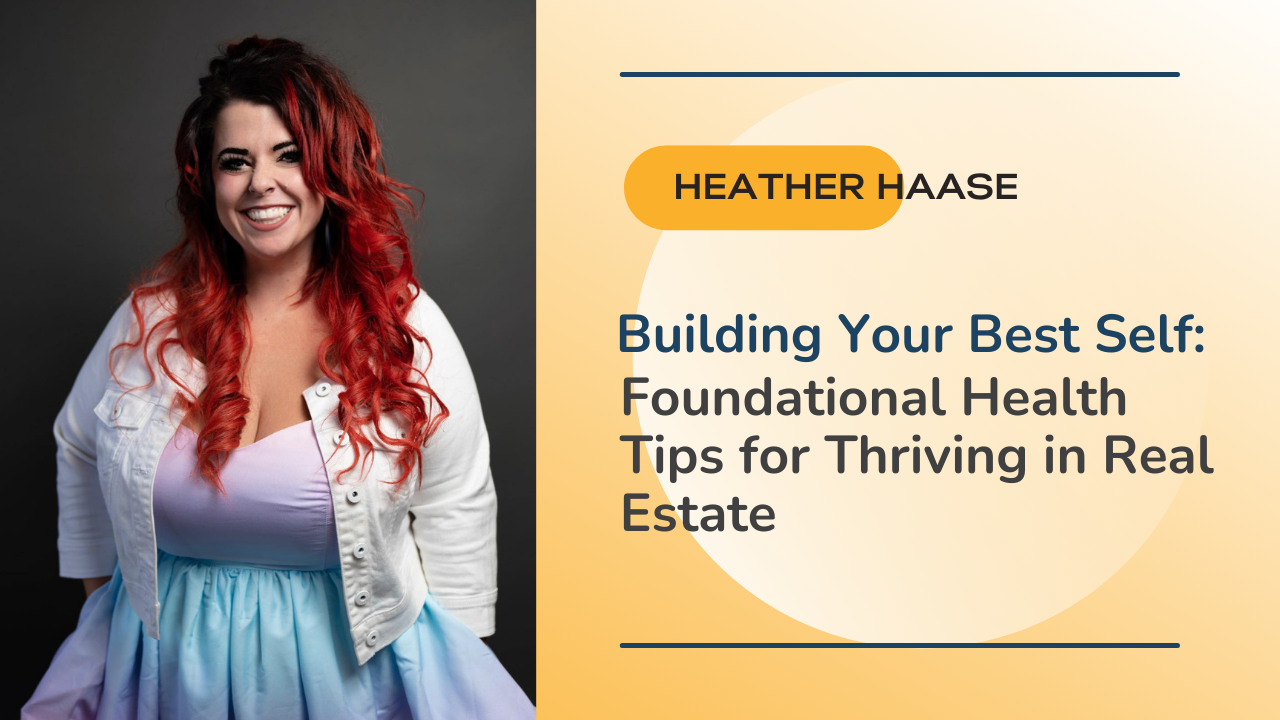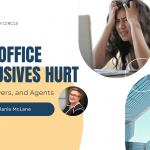Your phone never stops ringing, There’s always another property to show, Don’t forget the 2-3 hours of lead gen you need to be doing, Plus creating content…Oh and you need to volunteer and remember you have a life outside of your job. It’s easy to let your health take a backseat when you are in real estate. But here’s the truth: your most valuable asset isn’t the luxury listing you’re about to close; it’s you. Staying healthy isn’t just about feeling good—it’s about being at your best, every single day, so you can crush your goals, impress your clients, and keep that unstoppable energy flowing, as well as providing for yourself and the life you want.
Imagine approaching each day with the same excitement as your first big sale, not because you’re running on caffeine and adrenaline, but because you’re genuinely energized and ready to take on whatever the day throws your way. By making your health a priority, you’re not just investing in your well-being; you’re also boosting your productivity, sharpening your focus, and building the resilience to thrive in this competitive industry.
In this article, we’ll explore practical, easy-to-implement tips that can help you stay at the top of your game—physically, mentally, and emotionally. Because when you feel good, you do good. And in the world of real estate, that’s a win-win for you and everyone impacted by you.
Prioritizing Your Physical and Mental Health
In 2020, I found myself at over 350 lbs, battling the toughest fight of my life. I had been infected with COVID-19, which left me sicker than I’d ever been and facing long-lasting heart and breathing issues. On top of that, my depression was at an all-time high, and life threw a few more curveballs my way. I hit rock bottom. My depression got so severe that I stopped eating altogether. But there was one glimmer of hope—I had recently discovered a new gym that I actually enjoyed, and for the first time in a long time, I was sticking with it. That gym became my lifeline, the one thing keeping me from spiraling further.
But after six weeks of barely eating and losing 20 pounds in a way I wouldn’t recommend to anyone, I had a moment of clarity. I was sick of my own sh*t and decided it was time to take action. I reached out for help—I called a therapist, a doctor, and a dietician. The first thing I told my therapist was, “I am so broken, and I need someone to fix me.” With their support, I started to rebuild myself. I learned that I wasn’t eating unhealthy food per se, but I was eating the wrong foods for my body (turns out, I have an intolerance to things like garlic and broccoli).
My doctor and therapist diagnosed me with severe depression, severe anxiety, and severe ADHD. Fortunately, most of my health levels were in a decent range, but there was still concern about pre-diabetes. With the help of my “team,” we set out on a mission to create a healthier, happier version of me. Six months later, I had lost around 80 pounds, was running 5Ks, and felt more energized than I had in years. This transformation improved every aspect of my life. And yes, all of this happened while I was still running my business and being a single mom. I know not everyone has the luxury of forming a team, so here are some of the things I did that might help you too.
1. Prioritize Physical Fitness:
Incorporating movement and a routine into your daily life is key, but it’s important to remember that this looks different for everyone. Factors like time, motivation, money, and resources all play a role in what works best for you. For me, I knew I needed a gym that was within 7 minutes of my home, and I had to invest enough money to keep myself motivated. The environment had to be right too—I thrive in good group settings because I’m not naturally self-motivated. Eventually, I became one of those 5 a.m. gym-goers, hitting the gym 4-6 times a week. I also make sure to mix up my workouts to keep things interesting.
2. Maintain a Balanced Diet:
First and foremost, staying hydrated is crucial. For me, finding the right water bottle made all the difference—a 40 oz cup with a straw that’s both pretty and fits in my cup holder. I make sure to drink from it 3-4 times a day. When I first started, I used a fun app called Plant Nanny to gamify my water intake and keep myself motivated.
Next, it’s important to take stock of what you’re eating. I recommend journaling everything you eat for a week and then assessing where you can make improvements. Maybe you’ll find time on Sundays to meal prep, or perhaps you can start by adding a handful of kale to your smoothie. Remember, your body doesn’t like to feel deprived, so I often focus on adding something healthy before taking anything away. I also pay attention to portion sizes and make sure to always have healthy snacks on hand.
3. Prioritize Mental Health:
Seeking support was the biggest factor in improving my mental health, and from there, I picked up strategies that helped me along the way. You might remember from a previous article where I mentioned “Open Path Collective” as a resource that made therapy more affordable for me. In addition to therapy, I started practicing ADHD-friendly meditation using noise-canceling headphones and deep breathing exercises. I also found that journaling occasionally helped me process my thoughts. Another crucial aspect was changing the way I spoke to myself—I made it a priority to speak to myself with the same kindness and compassion I would use with my own child. If I wouldn’t say it to them, I shouldn’t say it to myself.
4. Get Enough Sleep:
I’m still working on improving my sleep, especially since I sometimes struggle with insomnia, which is why I’m up late writing this. To tackle this, I’ve started implementing a consistent bedtime routine, including a strict lights-off time and limiting my use of electronics before bed. I also play calming music to create a soothing environment, doing everything I can to make my space as comfortable as possible for a good night’s rest.
5. Stay Connected Socially:
In a profession as demanding as real estate, it’s easy to become consumed by work, but nurturing connections with family, friends, and loved ones can provide the balance and support you need. These relationships serve as a vital source of encouragement, grounding you during stressful times and reminding you that there’s more to life than just the next deal. I have a huge network of Real Estate friends who can relate to what is happening in my life. I also make time for my daughter as much as possible.
Beyond your immediate circle, joining a community—whether it’s a local group or an online network—can offer additional layers of support. Engaging with others who share similar experiences allows you to exchange ideas, share challenges, and celebrate successes together. I belong to a local women’s network
6. Regular Health Check-Ups:
As referred to in my story at the beginning, Scheduling regular medical exams is essential for catching potential health issues early, while mental health screenings should also be a priority in your overall health plan. Just as routine check-ups help you stay on top of your physical health, mental health check-ins can identify early signs of stress, anxiety, or depression, allowing you to seek support before issues escalate. By prioritizing both your physical and mental well-being, you ensure that you’re equipped to handle the demands of your career and life.
Conclusion
It’s easy to get caught up in the hustle and forget to take care of the most important asset—you. Prioritizing your health, both physically and mentally, you’re not only investing in your well-being but also in your ability to serve your clients and grow your business effectively. Incorporating healthy habits into your routine, seeking support when needed, and staying proactive about your health can make all the difference in your performance and overall happiness.
Remember, a healthy, energized you is the foundation for success in real estate. By taking small, consistent steps toward better health, you’ll not only feel better but also be better equipped to handle whatever challenges come your way. Here’s to a healthier, happier, and more successful you!








Leave a Reply